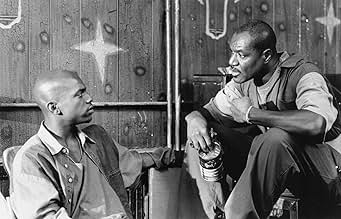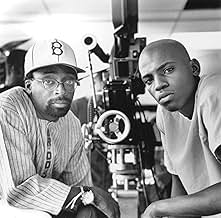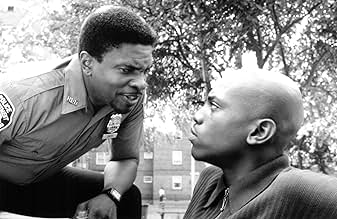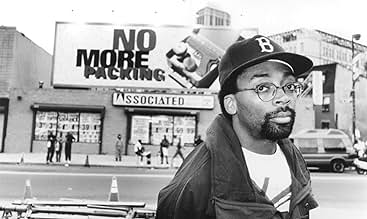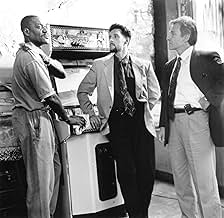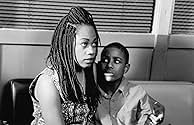I giovani spacciatori di droga nei progetti di Brooklyn vivono vite dure e pericolose, intrappolati tra i loro capi della droga e gli investigatori che vogliono fermarli.I giovani spacciatori di droga nei progetti di Brooklyn vivono vite dure e pericolose, intrappolati tra i loro capi della droga e gli investigatori che vogliono fermarli.I giovani spacciatori di droga nei progetti di Brooklyn vivono vite dure e pericolose, intrappolati tra i loro capi della droga e gli investigatori che vogliono fermarli.
- Premi
- 6 candidature totali
- Tyrone
- (as Pee Wee Love)
- Errol Barnes
- (as Tom Byrd)
- Go
- (as Fredro)
- Horace
- (as E.O. Nolasco)
- Sharon
- (as Lisa Arrindell Anderson)
Recensioni in evidenza
It is not an easy film. It is bleak and at times very off-putting. Actually, if you are a thinking, caring person, this is movie is overall heart-breaking.
But it is brilliant and, for the person who truly tries to understand it, a compelling, insightful look at the problems killing black America today. The only reason for the film's lack of recognition I can imagine is that its subject matter had been examined a number of times before. But the inescapable fact is that this one of the best examinations of the subject matter there has been on screen - on par with "Boyz N The Hood".
And it is FAR from uncreative. In fact, on one level, it is not a "hood" movie, but a whodunit. The mystery aspect of the plot is very interesting. But there are other, more important layers. It is the story of the confusion and crisis of a young man's life. Most importantly, it is a brutal look at drugs, guns, and life in the projects. It is a movie asking why so many young black men are dying in the streets.
The lead character Strike has a stomach problem. It might be an ulcer or something like that. I believe it is a metaphor. Just as heat represented racial tension in Lee's masterpiece "Do The Right Thing", Strike's sickness represents the illnesses plaguing the ghetto: drugs, guns, liquor.
Like DTRT, this film looks at community. The mothers, the cops, the young people, the kids, the men trying to make a living - there is eloquent commentary in "Clockers" on the situations of all. In Spike's movies, paying a little attention is rewarding. A good essay could be written on what I call the Spike Summarization technique. This is when Spike compresses a serious debate or concern in the black community into a few expressive moments of action or dialogue. There are better examples in other movies, but it manifests in "Clockers" a few times. A bunch of kids are sitting in front of Rodney's (Delroy Lindo) shop; one of the kids is rapping while the others pay attention. The two sides to the coin: we feel the artistry and skill of the moment, the continuation of a rich tradition of oral art; we're also struck by the cruelty and coldness in the kid's violent lyrics, and we think about where that comes from.
Stylistically, this movie is a huge success. The cinematography is amazing, and I wonder what must be wrong with my tastes when I'm floored by a film like this and find visually bland a more oft-praised classic. The projects become blinding panoramas, landscapes which add tons of meaning to the poignant ending (I won't reveal it here). The sound is great; many films of this nature use hip hop in the soundtrack to produce certain effects, but "Clockers" does it in a more methodical way which jars some people, but contributes to the film's meaning.
I could say more about the film, but I encourage you to just see it, along with the rest of Spike's oeuvre. He's not a perfect filmmaker, and some of his best films are marred by elements that don't work, but I feel his consistency in terms of delivering brilliance is not below most of the cinema's most celebrated auteurs.
The main plot is a form of crime thriller, with Keitel playing the cop trying to uncover the truth behind the murder. However the plot is not what this film is about - this is basically a film about the effects on drugs on the NY ghettos. Strike is the "average black man", while his protégé, Tyrone (Peewee Love) is "black youth". The film tries to show the forces placed on them by their situation, their role models and the few options they have in life. Rodney represents the draw of selling drugs, of quick money while policemen Andre (Keith David) and Klein represent his conscience trying to get him to do the right thing - Andre and Tyrone's mother (Regina Taylor) particularly doing right by your own community.
The message is at times forced, Keitel's sequence towards the end is very clever cinematically but feels a bit like a sermon, but at other times we're allowed to work it out ourselves. Strike is not judged but allowed to be pulled by the situation around him, his sickness representing the sickness of his situation. Through him we see the pressures that are on him to act like his peers and the bad role-models he has in his life. In Shorty we see the same things affect the next generation and, while his aping of Strike is clumsy, you again see how the lack of good role-models reduces the options for an otherwise intelligent kid. The best thing about the comparison of Lindo and Keitel is that neither is judged - both are allowed to show themselves as appealing, Lindo appears as a parent, almost seeking the best for all his workers and Keitel is allowed to be an honest cop with a good moral code. However both are also seen in a bad light, Lindo brings out the violence, pressure and treachery of his character - a man who is really out for himself while the way Keitel pressures Strike is seen as bad as Rodney's pressure and reveals a racist angry streak within himself. We are left wondering how anyone can survive between the two.
Phifer is good as Strike and manages to avoid just doing a ghetto-movie type of performance, he makes you believe that he is trapped in a no-win situation. Isaiah Washington gives another in a string of strong performances as the honest man trying to get by. Lindo is great as drug dealer Rodney, mixing paternal aspirations with moments of sudden viciousness. Keitel and John Turturro act below their station and aren't given much to work with, Keitel especially doesn't always manage to carry the moral core of the story without preaching. Two small roles of interest are Tom Byrd as Errol who has plays the fallen dealer with AIDS, however not enough is explained about his character, also Michael Imperioli (better known as Chris in The Sopranos) plays bent cop Jo-Jo. Peewee Love stands out as Shorty/Shorty, sucked into a world that lacks choice.
The film looks great, the whole thing has a bright colourful sheen on it that is very attractive to look at. Combined with Lee's stylish director it makes for a beautiful film - although some scenes are shot differently and on different stock, to make a point, although I'm not sure what that point is. The music is as good as most of Lee's movies, a mix of soul and hip hop, it is better than many ghetto films that just assume that the hip hop is all that's needed to help the mood.
This is a good example of the lack of options that exist in the ghetto and, besides some very obvious preaching, it makes it's point without shouting it at the audience. The only failing is that Lee bottles it near the end, delivering a sentimental ending of hope that is unfortunately not the truth in many cases.
Lo sapevi?
- QuizWas originally supposed to be directed by Martin Scorsese. Rocco Klein would have been the main character, played by Robert De Niro. Scorsese changed his mind, opting instead to direct Casinò (1995), and De Niro went with him. Scorsese then asked Spike Lee if he wanted to direct. Lee accepted (and decided that Strike, not Rocco, would be the primary character), and Scorsese was given an "Executive Producer" credit.
- BlooperWhen Detective Mazilli is walking up to the back of the Mercedes Benz to talk to the kids inside his badge/shield is that of an NYPD Detective. However when he shows it to the driver of the car it is the shield of a NYPD Sergeant.
- Citazioni
Rodney: If God created anything better than crack cocaine, he kept that shit for hisself. I mean, that shit is like truth serum. It will truly expose who you are. I mean, you happen to be a low-life rat bastard motherfucker, who will sell off his newborn for a suck off that glass dick, crack will bring it right on in the light. Now, I don't care you black, white, Chinese, rich, poor. You take that first hit, you on a mission. And that mission will never end. Even when the house, the money, loved ones are gone, they send you to the joint, you still gonna try to cop.
Ronald 'Strike' Dunham: No doubt.
Rodney: Only time it ends, Strike, that mission, when you six feet under.
- ConnessioniFeatured in Crooklyn Dodgers: Return of the Crooklyn Dodgers (1995)
I più visti
- How long is Clockers?Powered by Alexa
Dettagli
- Data di uscita
- Paese di origine
- Lingua
- Celebre anche come
- Clockers: Hermanos de sangre
- Luoghi delle riprese
- Aziende produttrici
- Vedi altri crediti dell’azienda su IMDbPro
Botteghino
- Budget
- 25.000.000 USD (previsto)
- Lordo Stati Uniti e Canada
- 13.071.518 USD
- Fine settimana di apertura Stati Uniti e Canada
- 4.463.560 USD
- 17 set 1995
- Lordo in tutto il mondo
- 13.071.518 USD
- Tempo di esecuzione2 ore 8 minuti
- Colore
- Mix di suoni
- Proporzioni
- 1.85 : 1
Contribuisci a questa pagina



